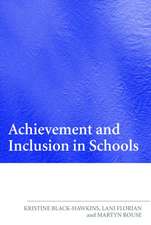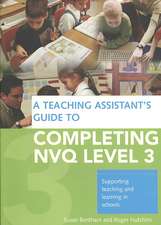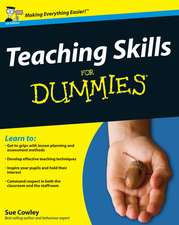Wellbeing, Equity and Education: A Critical Analysis of Policy Discourses of Wellbeing in Schools: Inclusive Learning and Educational Equity, cartea 1
Autor Jennifer Spratten Limba Engleză Hardback – 6 feb 2017
This book critically examines multiple discourses of wellbeing in relation to the composite aims of schooling. Drawing from a Scottish study, the book disentangles the discursive complexity, to better understand what can happen in the name of wellbeing, and in particular, how wellbeing is linked to learning in schools. Arguing that educational discourses have been overshadowed by discourses of other groups, the book examines the political and ideological policy aims that can be supported by different discourses of wellbeing. It also uses interview data to show how teachers and policy actors accepted, or re-shaped and remodelled the policy discourses as they made sense of them in their own work.
When addressing schools’ responses to inequalities, discussions are often framed in terms of wellbeing. Yet wellbeing as a concept is poorly defined and differently understood across academic and professional disciplines such as philosophy, psychology, healthpromotion, and social care. Nonetheless, its universally positive connotations allow policy changes to be ushered in, unchallenged. Powerful actions can be exerted through the use of soft vocabulary as the discourse of wellbeing legitimates schools’ intervention into personal aspects of children’s lives. As educators worldwide struggle over the meaning and purpose of schooling, discourses of wellbeing can be mobilised in support of different agendas. This book demonstrates how this holds both dangers and opportunities for equality in education. Amartya Sen’s Capability Approach is used to offer a way forward in which different understandings of wellbeing can be drawn together to offer a perspective that enhances young people’s freedoms in education and their freedoms gained through education.
| Toate formatele și edițiile | Preț | Express |
|---|---|---|
| Paperback (1) | 720.22 lei 43-57 zile | |
| Springer International Publishing – 13 iul 2018 | 720.22 lei 43-57 zile | |
| Hardback (1) | 726.23 lei 43-57 zile | |
| Springer International Publishing – 6 feb 2017 | 726.23 lei 43-57 zile |
Preț: 726.23 lei
Preț vechi: 885.64 lei
-18% Nou
Puncte Express: 1089
Preț estimativ în valută:
139.01€ • 151.04$ • 116.84£
139.01€ • 151.04$ • 116.84£
Carte tipărită la comandă
Livrare economică 21 aprilie-05 mai
Preluare comenzi: 021 569.72.76
Specificații
ISBN-13: 9783319500645
ISBN-10: 3319500643
Pagini: 147
Ilustrații: XI, 147 p. 10 illus.
Dimensiuni: 155 x 235 x 17 mm
Greutate: 0.4 kg
Ediția:1st ed. 2017
Editura: Springer International Publishing
Colecția Springer
Seria Inclusive Learning and Educational Equity
Locul publicării:Cham, Switzerland
ISBN-10: 3319500643
Pagini: 147
Ilustrații: XI, 147 p. 10 illus.
Dimensiuni: 155 x 235 x 17 mm
Greutate: 0.4 kg
Ediția:1st ed. 2017
Editura: Springer International Publishing
Colecția Springer
Seria Inclusive Learning and Educational Equity
Locul publicării:Cham, Switzerland
Cuprins
1. Introduction.- 1.1 The research study.- 1.2 The structure of the book.- 2. Discourse and Policy.- 2.1 What is discourse?.- 2.2 How discourse works: discourse and ideology.- 2.3 Different schools of thought in studies of discourse.- 2.4 Discourse and policy.- 2.5 Discourse analysis.- 2.6 Summary.- 3. Equity, Schooling and Wellbeing.- 3.1 Equality of what?.- 3.2 Liberal ideologies in education.- 3.3 International influences on policy.- 3.4 The multiple purposes of schooling.- 3.5 Equality of what? The Capability approach.- 3.6 Summary.- 4. Conceptualising Wellbeing.- 4.1 Wellbeing – an ill-defined term.- 4.2 Identifying discourse of wellbeing used in education.- 4.3 Discursive theme 1: Physical health promotion.- 4.4 Discursive theme 2: Psychological discourses of social and emotional literacy.- 4.5 Discursive theme 3: Discourse of care.- 4.6 Discursive theme 4: Philosophical discourse of flourishing.- 4.7 Discursive theme 5: The emergent theme of sustainability.- 4.8 Summary.- 5. Conceptualising Relationships between Learning and Wellbeing.- 5.1 Introduction.- 5.2 Fielding’s typology of schooling.- 5.3 Using Fielding’s typology to examine the discursive relationships between learning and wellbeing.- 5.4 Using Fielding’s typology in discourse analysis.- 5.5 Summary.- 6. Discourses of Wellbeing in Scottish Policy.- 6.1 Introduction.- 6.2 Health and wellbeing in Curriculum for Excellence.- 6.3 Use of language in the policy texts.- 6.4 The discursive representation of wellbeing in Scottish policy.- 6.5 Conclusions.- 6.6 Summary.- 7. Interactions between Wellbeing and Other Purposes of Schooling in Scottish Policy.- 7.1 The purpose of the Scottish curriculum – the ‘four capacities’.- 7.2 Economic strategy.- 7.3 Discursive links between wellbeing and learning.- 7.4 Summary.- 8. The Discursive Gap: Interpretation of Policy by Professionals.- 8.1 The study participants.- 8.2 Evidence of patterns in the data.- 8.3 Findings from the interviews.- 8.4 Summary.- 9. Towards a More Comprehensive Understanding of Wellbeing and Equity in Education.- 9.1 Problematizing wellbeing discourses in schools.- 9.2 Wellbeing, equity and education – towards a more comprehensive understanding through the capability approach.- 9.3 A final note.- 10. Appendix – Research methods.- 10.1 Data collection.- 10.2 Using critical discourse analysis.- 11. References.
Textul de pe ultima copertă
This book critically examines multiple discourses of wellbeing in relation to the composite aims of schooling. Drawing from a Scottish study, the book disentangles the discursive complexity, to better understand what can happen in the name of wellbeing, and in particular, how wellbeing is linked to learning in schools. Arguing that educational discourses have been overshadowed by discourses of other groups, the book examines the political and ideological policy aims that can be supported by different discourses of wellbeing. It also uses interview data to show how teachers and policy actors accepted, or re-shaped and remodelled the policy discourses as they made sense of them in their own work.
Caracteristici
Brings clarity to the discursive complexity around wellbeing in schools Critically examines the multi-faceted relationships between wellbeing and learning Identifies dangers and opportunities for equality created by the discourses of wellbeing Shows what teachers, uniquely, can bring to the wellbeing of children, through education Includes supplementary material: sn.pub/extras















